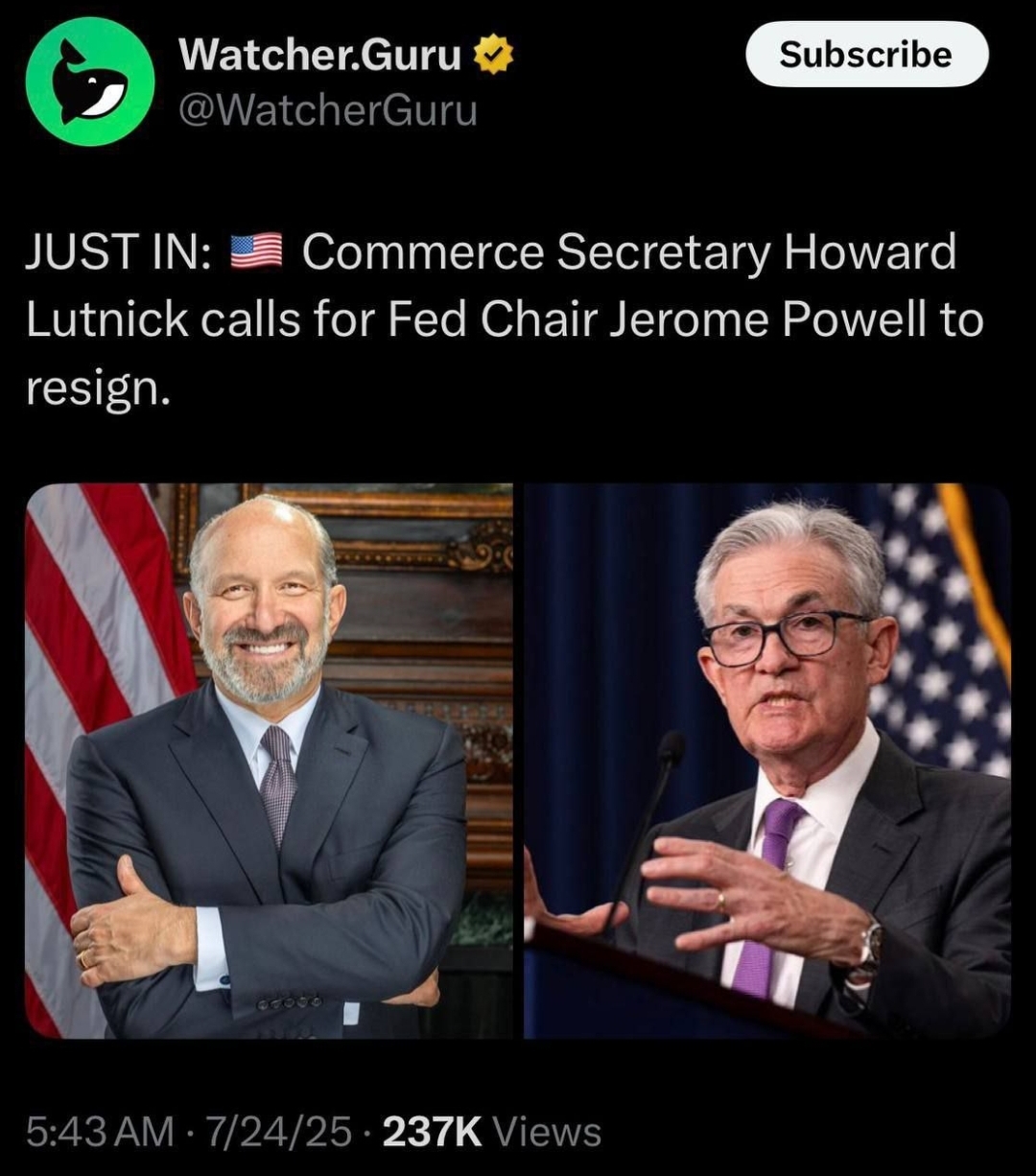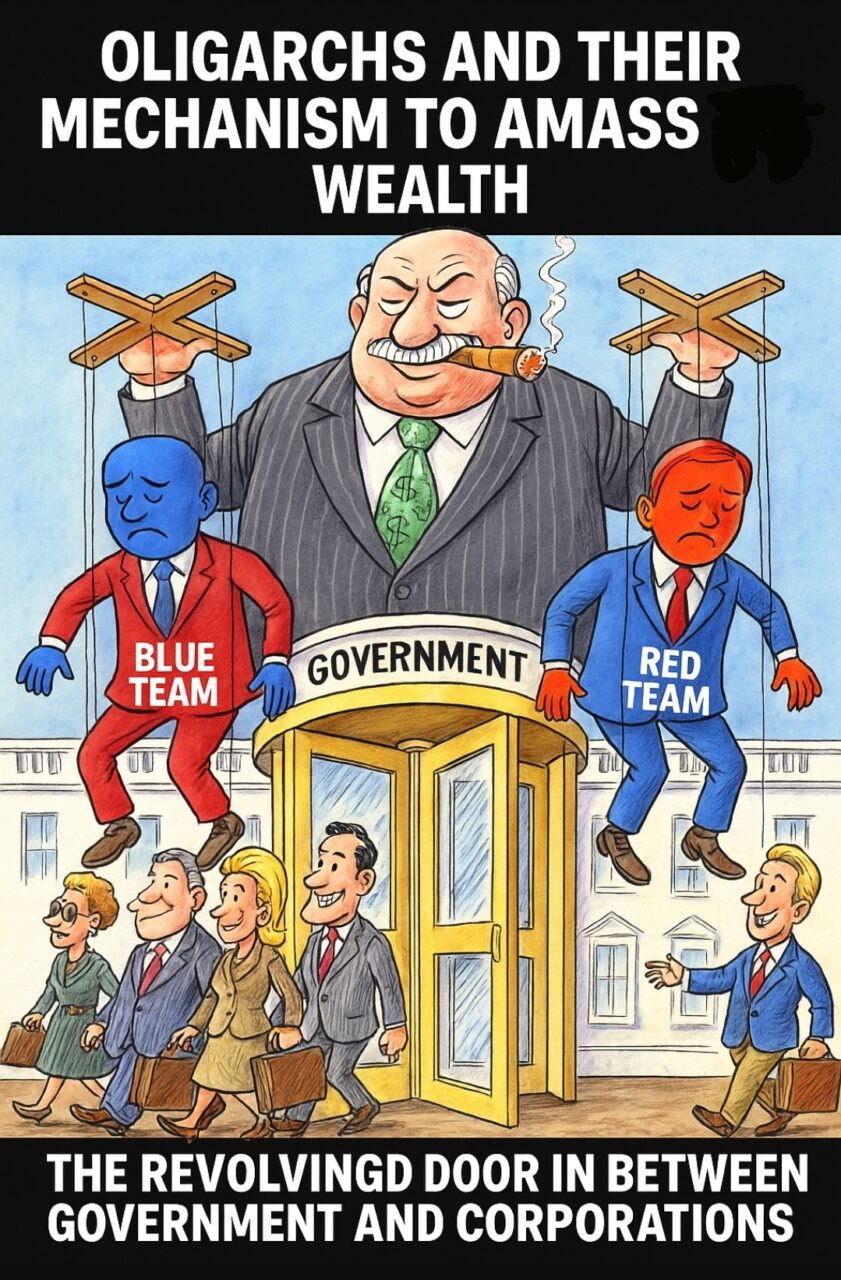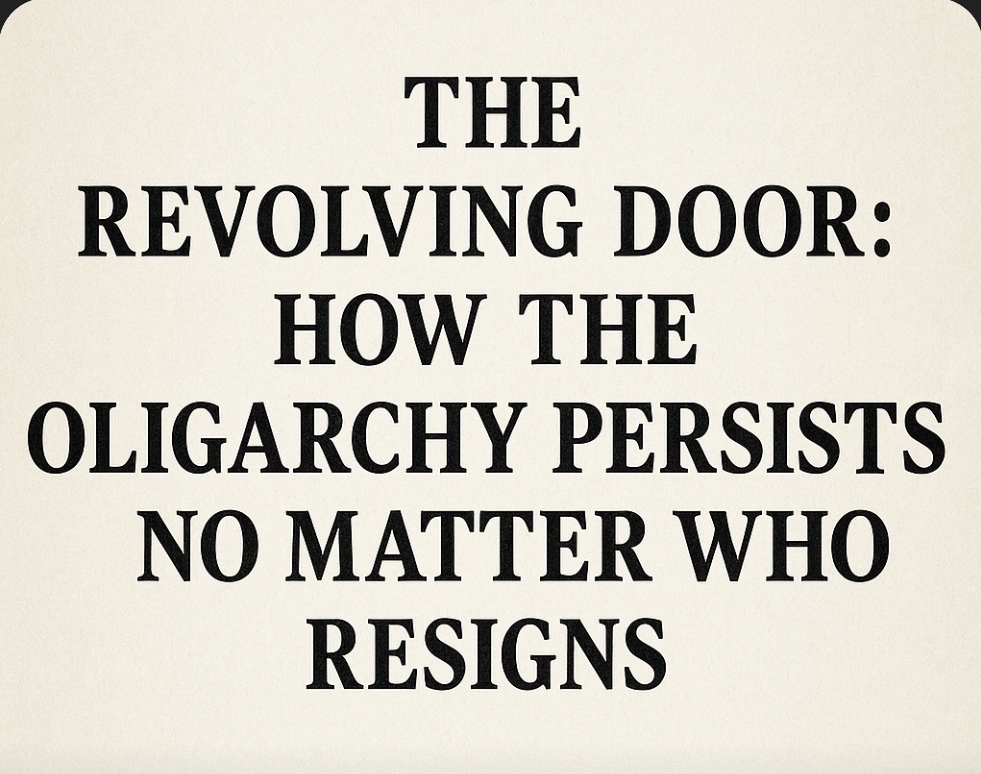Introduction: The Illusion of Change
Every so often, the public is offered a political spectacle: a prominent figure resigns, is called to resign, or faces scrutiny—like Fed Chair Jerome Powell now facing pressure from Commerce Secretary Howard Lutnick.

To the uninformed, it feels like justice. Like accountability. Like maybe, finally, something will change.
But those paying attention know better.
The real power is not in the individual—it’s in the system that produces and protects them. And that system operates through an invisible but well-oiled machine known as the revolving door.

What Is the Revolving Door?
The “revolving door” refers to the seamless transition of elites between public service and private sector power. Today’s Treasury Secretary may have been yesterday’s hedge fund CEO. Tomorrow’s Federal Reserve Chair could be today’s investment banker or vice versa.
It’s not corruption in the shadows—it’s corruption baked into the structure.
This system guarantees that the interests shaping economic, defense, regulatory, and energy policies are never the people’s interests—but corporate and elite interests.
The Fed and Wall Street: The Central Loop
Jerome Powell
Before becoming Fed Chair, Powell was a partner at The Carlyle Group, one of the most powerful private equity firms on earth—a firm deeply intertwined with government contracts, foreign policy shaping, and high-level military-industrial investments.
Steven Mnuchin
Trump’s Treasury Secretary, Mnuchin came directly from Goldman Sachs and hedge funds, then returned to private finance after overseeing pandemic bailouts that enriched corporate America.
Janet Yellen
She was Chair of the Federal Reserve, then a paid speaker for Wall Street, then Biden’s Treasury Secretary. She collected millions in speaking fees from banks she now “regulates.”
This is not oversight. It’s incestuous consolidation.
Corporate Power Across Both Parties
The revolving door doesn’t care about red or blue:
- Bush’s administration was packed with energy and defense execs.
- Obama’s administration was Wall Street heavy (Larry Summers, Timothy Geithner, Rahm Emanuel).
- Trump appointed billionaires, bankers, and private equity veterans.
- Biden’s top appointees are again former lobbyists, bankers, and CFR alumni.
This isn’t about ideology—it’s about protecting the oligarchic machine that profits regardless of policy.
Key Institutions Compromised by the Revolving Door
- Federal Reserve – Controlled by former bankers.
- Treasury Department – Often led by finance insiders.
- SEC – Supposed to regulate Wall Street, but filled with ex-Wall Streeters.
- FDA & CDC – Regulated by Big Pharma, then employed by them.
- DoD – Officials cycle between Raytheon, Boeing, Lockheed, and Pentagon posts.
- CIA/DHS/NSA – Executives rotate through firms like Booz Allen Hamilton, Palantir, and Amazon Web Services.
No agency is spared. No oversight is independent.
The Economic and Moral Cost
The revolving door doesn’t just subvert democracy—it inflicts real harm:
- Bailouts for bankers, foreclosures for families.
- War profits for defense firms, body bags for soldiers.
- Privatized health gains, public health chaos.
- Regulatory capture, where corporations write the rules that supposedly govern them.
- Financial cartels (like BlackRock and Vanguard) quietly own a piece of everything—banks, media, weapons, and even the regulators.
Meanwhile, citizens argue about left and right while the revolving door spins on, undisturbed.
Why Resignations Don’t Change the System
When Jerome Powell resigns (if he does), the headlines will cheer. But ask:
- Will his replacement challenge the fiat system?
- Will they stop using debt as currency?
- Will they end quantitative easing and market manipulation?
- Will they refuse elite capture and corporate collusion?
Unlikely.
Because the replacement will be groomed, selected, and confirmed by the same machine.
They may have a different style—but they will serve the same system.
The Only Way Out: Structural Disruption
We don’t need a new actor—we need a new stage.
That means:
- Term limits for all federal offices and agencies.
- Lifetime bans on lobbying and corporate employment after public office.
- Criminal enforcement of insider trading and financial fraud by political actors.
- Audit and decentralize the Federal Reserve.
- Eliminate revolving door pipelines (like McKinsey, BlackRock, Goldman Sachs, Carlyle Group).
- Return to constitutional money, local sovereignty, and citizen oversight.
Without that, resignations are theater, not justice.
Conclusion: Revolving Elites, Static Oppression
The oligarchy persists not despite the revolving door, but because of it.
And until the public stops celebrating individual resignations and starts dismantling the system that recycles power, nothing will truly change.
“The old revolving door was too slow,” one cartoon joked.
Now it’s not a door—it’s a high-speed corporate conveyor belt.
Replacing Powell is not the victory.
Removing the belt is.







